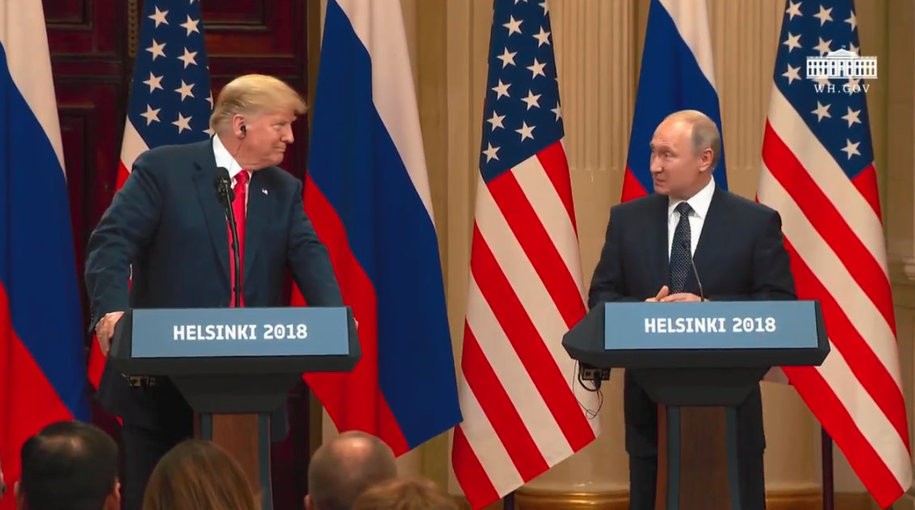Some thoughts on Trump’s
Europhobia
He got there by stepping through the looking glass.
Once on the other side, he made a
series of extraordinary statements.
He accused Germany of being “totally
controlled by Russia.”
He declared that the European Union is a “foe” of the United States.
He told British Prime Minister Theresa May she should sue the EU instead of negotiate with it.
He declared that the European Union is a “foe” of the United States.
He told British Prime Minister Theresa May she should sue the EU instead of negotiate with it.
And, just days after the U.S.
intelligence community and special counsel Robert Mueller confirmed once again
that the Russian government interfered in the 2016 elections, Trump said that
he believed in Vladimir Putin’s claims of Russian innocence.
 |
| The exchange of knowing glances (this is an actual White House photo) |
Does Russia have some dirt on him?
Maybe. But whatever else is going
on, Trump’s erratic behavior reflects a very specific worldview. Trump is
attacking Europe and siding with Russia for political — and not just personal —
reasons.
A segment of the U.S. right wing, which has now coalesced around Trump, has always been skeptical about Europe.
 |
| For more cartoons by Nick Anderson, CLICK HERE. |
It hates the social democratic ideals baked into the European system. Indeed, any U.S. politician that leans in that direction inevitably gets branded a “European socialist.”
Then there are the more pacifist
inclinations of Europe. Old hawks like Donald Rumsfeld famously railed against
EU stalwarts like France and Germany that opposed the U.S. misadventure in
Iraq. (Remember “freedom fries”?)
These trends converge in the Euroskepticism expressed by media outlets like Fox
News, a sentiment that heavily influenced the George
W. Bush administration. To them, the European Union represented a kind of
super-socialism that was spreading eastward and threatening U.S. global
dominance.
The other major contribution to
Trump’s worldview comes from Europe itself. Right-wing nationalist movements
like the Brexit campaign have tried to unravel the European Union.
These Euroskeptics view Brussels as
an outside force trying to impose unwelcome regulations, immigrants, and
political customs.
For instance, the Polish and Hungarian governments are establishing illiberal regimes that challenge freedom of the press, judicial independence, and the free functioning of civil society the EU demands.
For instance, the Polish and Hungarian governments are establishing illiberal regimes that challenge freedom of the press, judicial independence, and the free functioning of civil society the EU demands.
But there’s another strong
Euroskeptic voice: Vladimir Putin.
Under Putin, Russia has supplied
rhetorical and financial support for far-right wing parties throughout Europe —
the National Front in France, the Freedom Party in Austria, the Northern League in Italy.
Putin and the Euroskeptics are anti-immigrant and anti-liberal, and they favor nationalist and law-and-order policies.
Putin and the Euroskeptics are anti-immigrant and anti-liberal, and they favor nationalist and law-and-order policies.
But Putin also sees opportunity in
Euroskepticism. A weaker EU won’t be able to attract new, post-Soviet members
like Ukraine or Moldova. A weaker EU will be more dependent on Russian energy
exports. A weaker EU would have less power to criticize Russia’s political and
foreign policy conduct.
Which brings us back to Donald
Trump.
The president has declared Europe an
enemy because of its trade policies. But that’s just a red herring. He actually
has a more systemic critique of the EU that coincides with the worldview of
Vladimir Putin, Europe’s right-wing nationalists, and Euroskeptics among
America’s conservatives.
This is very bad news. If the crisis
in transatlantic relations were just about trade, it could be handled by some hardnosed
negotiating. If the disputes with the EU and NATO were simply about Trump’s
disruptive style, then everything could be resolved by a regime change at the
polls in 2020.
But Trump has launched a much
larger, ideological assault on European institutions and values. What’s worse:
It’s part of the same attack on liberal values here in the United States.
Forget about NATO: Maybe we need a
transatlantic alliance against Trump.
John Feffer wrote the dystopian
novel Splinterlands and directs Foreign Policy In Focus, where a longer version
of this piece appeared. Distributed by OtherWords.org.